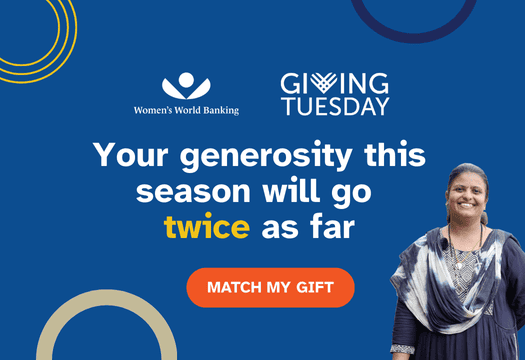Scroll down to the end of the blog to download the report.
This updated edition of Finance, Climate, and Gender arrives at a pivotal moment, highlighted by fresh data that reinforces a critical reality: the crises brought about by natural disasters and financial exclusion are deeply interconnected. The 2025 Global Findex reveals a stark truth—four out of five women without a bank account reside in countries highly vulnerable to climate risks. Further, over 800 million women lack access to the financial tools needed to receive relief payments during emergencies. These sobering statistics illustrate a pressing issue: women, who are disproportionately affected by climate change, remain excluded from financial systems that could bolster not only their own resilience, but also that of their families and communities.
Women’s World Banking recognizes that financial inclusion is not merely an aspirational goal; it is an essential foundation for resilience and financial well-being. For more than 45 years, the organization has been dedicated to supporting millions of women who remain outside the formal financial sector. The renewed evidence presented in this report strengthens the case for serving women better and building a more inclusive financial system. Without decisive global action, climate change could force as many as 158 million additional women and girls into poverty by 2050.
Contrary to perceptions of vulnerability, women are not powerless in the face of crisis. Across the globe, women are actively adapting, mitigating, and innovating to navigate environmental changes. They are farmers adopting drought resistant crops, fisherwomen reshaping their businesses in response to rising temperatures, and entrepreneurs embracing clean energy and sustainable practices.
As caregivers and community leaders, women organize recovery efforts and help strengthen social bonds after disasters. They are, in every sense, stewards of practical solutions. However, regardless of their ingenuity, without access to savings, credit, insurance, and digital payments, their resilience cannot be fully realized.
The latest Findex data clearly demonstrates persistent gaps in financial inclusion. Only 36% of women in emerging markets are saving through formal channels, and just half are able to mobilize emergency funds within 30 days. Despite significant increases in access to financial accounts, women’s use of financial products has not kept pace. Reconciling this disparity will require changes in the way financial services are designed and marketed to women so that financial solutions address women’s specific needs and lived realities. Women’s World Banking has long championed women-centered design informed by sex-disaggregated data, and by the end of June 2025, this approach has enabled the organization to reach over 91 million women and 54 million men with various financial services—contributing to job creation and robust economic growth.
Women’s World Banking is contributing to the growing array of solutions and programs that are available for scaling, including bundled financial products that combine savings, credit, and insurance to help women withstand climate shocks. As just one example, In India, a partnership with Bank of Baroda has empowered women entrepreneurs to protect themselves from risks such as heat stress and livestock mortality.
At the same time, we are working with policymakers to integrate gender considerations into national climate strategies. In Morocco, for example, we partnered with Bank Al-Maghrib to create a climate vulnerability assessment used for women working in agriculture, which in turn will inform the development of financial policy and products. And our research continues, expanding our understanding of the role that financial services can play in addressing the health impacts of climate change on women.
Our Ongoing Commitment
Women’s World Banking’s commitment is unwavering and stronger than ever. The organization continues to forge partnerships across public and private sectors to expand solutions that equip women to withstand climate shocks and empower them to lead in building more sustainable economies and driving job creation. The call to action is clear: Are you ready to partner with us to drive change? For collaboration opportunities, please contact info@womensworldbanking.org.




